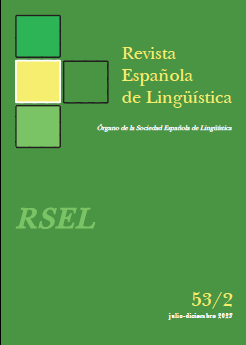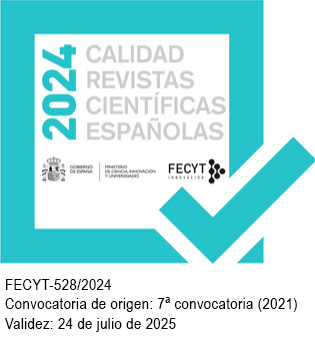Procedural meaning, contextual enrichment and geolectal variation: about the compound (and the simple) past
doi: https://doi.org/10.31810/rsel.53.2.1
Keywords:
Procedural semantics; pragmatic enrichment; compound past; simple pastAbstract
In this paper, we argue for the suitability of integrating semantic and pragmatic factors in the description of the compound and the simple past of Romance languages, to account for their intra- and interlinguistic functional diversity. Building on the semantic underdeterminacy thesis (Sperber and Wilson, 1995) and on the idea that tenses have procedural meaning (Moeschler, 1994, 1998; Nicolle, 1997, 1998; Saussure, 2003), we develop a description of the compound and the simple past in Romance, based on a limited set of combinations of semantic features. Some of these features are invariant and common to all Romance languages, while others present binary parametric options, whose value varies from one language to another and even, within the same language, from one geolectal variety to another. Our proposal is compatible with the idea of a rigid but underspecified procedural semantics, susceptible to contextual enrichment. The set of features and parametric options we propose account for the interpretations available in each variety. Additionally, semantic features systematically receive contextual enrichment, and this enrichment develops the underspecified semantics of the verb tense in different directions. Competition between semantically close linguistic expressions is also an important factor in the distribution of interpretative routes accessible to each tense.
Downloads
References
Abeillé, A. y Godard, D. (dir.) (2021). La grande grammaire du français. París: Actes Sud.
Aikhenvald, A. (2004). Evidentiality. Oxford: Oxford University Press.
Amenós Pons, J. (2010a). Los tiempos de pasado del español y el francés: semántica, pragmática y aprendizaje de E/LE. Perspectivas desde la Teoría de la Relevancia. Tesis doctoral. Madrid: UNED.
Amenós Pons, J. (2010b). Telling a story in French and in Spanish: Past tenses and temporal relations revisited. En I. Witczak-Plisiecka (Ed.), Pragmatic perspectives on language and linguistics 2009, vol. 1: Speech Actions, pp. 395-424. Cambridge: Cambridge Scholars Publishing.
Amenós Pons, J. (2011). Cross-linguistic variation in procedural expressions: semantics and pragmatics. En V. Escandell-Vidal, M. Leonetti y A. Ahern (Eds.), Procedural Meaning: Problems and Perspectives, pp. 233-266. Leiden: Brill.
doi: https://doi.org/10.1163/9780857240941_011
Amenós Pons, J. (2020). Eventos y situaciones. La referencia temporal. En V. Escandell-Vidal, J. Amenós Pons y A. Ahern (Eds.), Pragmática, pp. 166-189. Madrid: Akal.
Azpiazu, S. (2016). Evidencialidad en el pretérito perfecto compuesto del español. Revisión y propuesta. En R. González Ruiz, D. Izquierdo Alegría y Ó. Loureda Llamas (Eds.), La evidencialidad en español: Teoría y descripción, pp. 303-325. Madrid / Frankfurt del Meno: Iberoamericana / Vervuert.
Azpiazu, S. (2019). La composicionalidad temporal del pretérito compuesto en español. Berlín: De Gruyter. doi: https://doi.org/10.1515/9783110633658
Bello, A. (1847). Gramática de la lengua castellana destinada al uso de los americanos. Santiago de Chile: Imprenta del Progreso. (Edición manejada: Madrid, Edaf 1984).
Benveniste, E. (1966). Problèmes de linguistique générale 1. París: Gallimard.
Blakemore, D. (1987). Semantic Constraints on Relevance. Oxford: Blackwell.
Borik, O. (2006). Aspect and Reference Time. Oxford: Oxford University Press.
Bres, J. (2003). Temps verbal, aspect et point de vue : de la langue au discours, Cahiers de praxématique 41, 55-84.
Bres, J. (2007). Et plus si affinités… Des liaisons entre les instructions du plus-que-parfait et les relations d’ordre, Cahiers Chronos 18, 139-157.
Comrie, B. (1976). Aspect. Cambridge: Cambridge University Press.
Corblin, F.; de Swart, Henriette (Coord.) (2004). Handbook of French semantics. Stanford: CSLI Publications.
De Swart, H. (2000). Tense, aspect and coercion in a cross-linguistic perspective. En M. Butt and T. H. King (Eds.), Proceedings of the Berkeley Formal Grammar conference University of California, Berkeley, pp. 1-20. Stanford: CSLI Publications.
De Swart, H. y Molendijk, A. (2002). Le passé composé narratif: une analyse discursive de L’étranger de Camus. En B. Laca (Ed.), Temps et aspect : de la morphologie à l’interprétation, pp. 193-211. París: Presses Universitaires de Vincennes.
Delgado-Díaz, G. (2021). The Evolution of Spanish Past Forms. Londres/Nueva York: Routledge.
Depraetere, I. (1998). On the resultative character of present perfect sentences, Journal of Pragmatics 29, 597-613.
Dumont, J. (2013). Another look in the present perfect in an Andean variety of Spanish: Grammaticalization and evidentiality in Quiteño Spanish. En J. A. Cabrelli (Ed.), Selected Proceedings of the 16th Spanish Linguistics Symposium, pp. 279-291. Somerville, MA: Cascadilla Proceedings Project.
Escandell-Vidal, M.V. (2010). Futuro y evidencialidad, Anuario de Lingüística Hispánica XXVI, 9-34.
Escandell-Vidal, M. V. (2014). Evidential futures: The case of Spanish. En P. de Brabanter, M. Kissine, y S. Sharifzadeh (Eds.), Future times, future tenses, pp. 219-247). Oxford: Oxford University Press.
doi: https://doi.org/10.1093/acprof:oso/9780199679157.001.0001
Escandell-Vidal, M. V. (2019a). El futuro del español. Sistema natural frente a usos cultivados, Verba Hispánica 26, 15-33. doi: https://doi.org/10.4312/vh.26.1
Escandell-Vidal, M. V. (2019b). Evidential implicatures and mismatch resolution. En R. Carston, B. Clark y K. Scott (Eds.), Relevance, Pragmatics and Interpretation, pp. 66-79. Cambridge: Cambridge University Press.
doi: https://doi.org/10.1017/9781108290593
Escandell-Vidal, M. V. (2021). The semantics of the simple future in Romance: Core meaning and parametric variation. In Baranzini, L. and De Saussure, L. (Ed.) Aspects of Tenses, Modality and Evidentiality, Cahiers Chronos 31, Leiden: Brill.
Escandell-Vidal, M. V. (2022). Facetas del imperfecto: del significado a las interpretaciones. En M. Martínez-Atienza de Dios (Ed.), En torno a la delimitación de determinadas categorías lingüísticas, pp. 159-182. Berlín: De Gruyter.
doi: https://doi.org/10.1515/9783110767834
Escandell-Vidal, M. V. (en prensa). Understanding the Spanish imperfecto. Temporal dimensions and evidential effects. En J. Egetenmeyer, S. Dessì-Schmid y M. Becker (Eds.), Time, Aspect and Discourse Structure. Berlín: De Gruyter.
Escandell-Vidal, M. V.; Leonetti, M. (2000). Categorías funcionales y semántica procedimental. En M. Martínez, et al. (Coord.), Cien años de investigación semántica: De Michel Bréal a la actualidad, vol. 1, pp. 363-378. Madrid: Ediciones Clásicas.
Escandell-Vidal, M. V. y Leonetti, M. (2011). On the rigidity of procedural meaning. En M.V. Escandell-Vidal, M. Leonetti y A. Ahern (Eds.), Procedural meaning: Problems and perspectives, pp. 81-103. Leiden: Brill.
doi: https://doi.org/10.1163/9780857240941_005
Escandell-Vidal, M. V.; Leonetti, M.; Ahern, A. (Eds.) (2011). Procedural Meaning: Problems and Perspectives. Bingley: Emerald.
Escobar, A. M. (1997). Contrastive and innovative uses of the present perfect and the preterite in Spanish in contact with Quechua. Hispania 80, 859-870.
doi: https://doi.org/10.2307/345107
Kempas, I. (2006). Estudio sobre el uso del pretérito perfecto prehodiernal en el español peninsular y en comparación con la variedad del español argentino hablada en Santiago del Estero. Tesis doctoral. Helsinki: Universidad de Helsinki.
Labeau, E. (2022). The decline of the passé simple. Leiden: Brill.
Leonetti, M. (2022). Sobre los mecanismos de competición. Revista Española de Lingüística 52/2, 47-84. doi: https://doi.org/10.31810/rsel.52.2.3
Mateus, M. H. et al. (2003). Gramática da Língua Portuguesa. Lisboa: Caminho. 6ª edición.
Moeschler, J. (1994). Anaphore et déixis temporelles. Sémantique et pragmatique de la référence temporelle. En J. Moeschler, et al., Langage et pertinence. Référence temporelle, anaphore, connecteurs et métaphore, pp. 39-105. Nancy: Presses Universitaires de Nancy.
Moeschler, J. (1998b). Pragmatique de la référence temporelle. En J. Moeschler (Ed.), Le temps des événements, pp. 157-180. París: Kimé.
Moreno Cabrera, J. C. (2013). Cuestiones clave de la lingüística. Madrid: Síntesis.
Nicolle, S. (1997). A Relevance-theoretic account of be going to. Journal of Linguistics 33, 355-377.
Nicolle, S. (1998). A relevance theory perspective on grammaticalization. Cognitive Linguistics 9-1, 1-35.
Nishiyama, A.; Koenig, J-P. (2010). What is a perfect state? Language 86, 611-646. doi: https://doi.org/10.1353/LAN.2010.0014
Parrinha, S. R. (2014). Valores pragmáticos y discursivos en el uso del pretérito perfecto compuesto en el español de Buenos Aires. En S. Azpiazu (Ed.), Formas simples y compuestas del pasado en el verbo español, pp. 103-115. Lugo: Axac.
Real Academia Española y Asociación de Academias de la Lengua Española (2009). Nueva gramática de la lengua española. Madrid: Espasa.
Reichenbach, H. (1948). Elements of Symbolic Logic. Nueva York y Londres: The Free Press / Macmillan.
Rodríguez Louro, C. (2009). La referencia indefinida y la expresión de pasado en el español rioplatense argentino. En L. Colantoni y C. Rodríguez Louro (Eds.), Perspectivas teóricas y experimentales sobre el español de la Argentina, pp. 283-297. Madrid / Frankfurt del Meno: Iberoamericana / Vervuert.
Saussure, L. de (2003). Temps et pertinence. Éléments de pragmatique cognitive du temps. Bruselas: De Boeck / Duculot.
Schaden, G. (2009a). Present perfects compete. Linguistics and Philosophy 32 (2), 115-141. doi: https://doi.org/10.1007/s10988-009-9056-3
Schaden, G. (2009b). Composés et surcomposés. Le ‘parfait’ en français, allemand, anglais et espagnol. París: L’Harmattan.
Smith, C. (2003). Modes of discourse. Cambridge: Cambridge University Press.
doi: https://doi.org/10.1017/CBO9780511615108
Smith, N. (1990). Observations on the pragmatics of tense. UCL Working Papers in Linguistics 2: 82-94. https://www.phon.ucl.ac.uk/publications/WPL/90papers/UCLWPL2%205%20Smith.pdf
Soto, G. (2014). El pretérito perfecto compuesto en el español estándar de nueve capitales americanas: frecuencia, subjetivización y deriva aorística. En S. Azpiazu (Ed.), Formas simples y compuestas del pasado en el verbo español, pp. 131-146. Lugo: Axac.
Speas, P. (2008). On the syntax and semantics of evidentials. Language and Linguistics Compass 2(5), 940-965. doi: https://doi.org/10.1111/j.1749-818X.2008.00069.x
Sperber, D. y Wilson, D. (1995). Relevance. Communication and cognition. Oxford: Blackwell (2a edición).
Sperber, D. y Wilson, D. (1993). Pragmatics and time. UCL Working Papers in Linguistics 5, 277-298.
Squartini, M.; Bertinetto, P. M. (2000). The simple and compound past in Romance languages. En Ö. Dhal (Ed), Tense and aspect in the languages of Europe, pp. 403-439. Berlín y Nueva York: De Gruyter. doi: https://doi.org/10.1515/9783110197099
Unger, C. (2006). Genre, relevance and global coherence. Nueva York: Palgrave.
Veiga, A. (2014). Diacronía de he cantado/canté en el sistema verbal español. Subsistemas y variantes. En J.L. Ramírez Luengo, E.P. Velásquez Upegui (Eds.), La historia del español hoy. Estudios y perspectivas, pp. 151-179. Lugo: Axac.
Wigger, L.-G. (2005). Die Entwicklungsgeschichte der romanischen Vergangenheitstempora am Beispiel des Pretérito Perfeito Composto im Portugiesischen. Tubinga: Universidad de Tubinga.
Wilson, D. y Sperber, D. (1993). Linguistic form and relevance. Lingua 90, 1/2, 1-25.
Published
How to Cite
Issue
Section
Copyright (c) 2023 Revista Española de Lingüística

This work is licensed under a Creative Commons Attribution-NonCommercial-NoDerivatives 4.0 International License.











